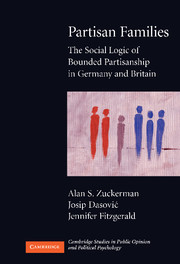Book contents
- Frontmatter
- Contents
- List of Figures and Tables
- Acknowledgments
- Preface: The Theoretical Approach, the Question, and the Data
- 1 The Social Logic of Partisanship: A Theoretical Excursion
- 2 Bounded Partisanship in Germany and Britain
- 3 A Multivariate Analysis of Partisan Support, Preference, and Constancy
- 4 Bounded Partisanship in Intimate Social Units: Husbands, Wives, and Domestic Partners
- 5 Bounded Partisanship in Intimate Social Units: Parents and Children
- 6 Partisan Constancy and Partisan Families: Turnout and Vote Choice in Recent British Elections
- Conclusion: Family Ties, Bounded Partisanship, and Party Politics in Established Democracies
- Appendix
- References
- Index
- Books in the Series
1 - The Social Logic of Partisanship: A Theoretical Excursion
Published online by Cambridge University Press: 05 June 2012
- Frontmatter
- Contents
- List of Figures and Tables
- Acknowledgments
- Preface: The Theoretical Approach, the Question, and the Data
- 1 The Social Logic of Partisanship: A Theoretical Excursion
- 2 Bounded Partisanship in Germany and Britain
- 3 A Multivariate Analysis of Partisan Support, Preference, and Constancy
- 4 Bounded Partisanship in Intimate Social Units: Husbands, Wives, and Domestic Partners
- 5 Bounded Partisanship in Intimate Social Units: Parents and Children
- 6 Partisan Constancy and Partisan Families: Turnout and Vote Choice in Recent British Elections
- Conclusion: Family Ties, Bounded Partisanship, and Party Politics in Established Democracies
- Appendix
- References
- Index
- Books in the Series
Summary
[A]nd man became a living being, – with a soul able to speak and reason.
Targum Onkeles on the phrase l'nefesh hayah in Genesis 2:7[M]an alone of all the animals is furnished with the faculty of language.
Aristotle, The Politics, II: 10 (Barker 1962, 6)As a social being the person needs to be capable of reading messages from other persons, or responding to these and of composing intelligible messages to send out…. This person has to have beliefs about how the world is and how it works, ontological knowledge, and knowledge about how other persons behave…. Equipped with the wherewithal to make choices, the rational social being will apply choice to dealings with other persons and will develop strategies for manipulating and controlling them and for escaping unwanted control.
Douglas and Ney (1998, 89)Partisanship is a socially derived choice. In this statement, we draw together two divergent theoretical sources: a socialized understanding of humans and a perspective that emphasizes persons as beings that seek to make reasoned decisions. Our perspective denies that social groups subsume individuals; people do more than simply act as reflections of their social categories and locations. As important, persons are also not “free floating atoms” (to recall Marx's criticism of liberal theory). People reason, but they do not necessarily maximize expected utility or make the objectively correct choices. Instead, they employ subjective or bounded rationality, seeking to do the best they can with the intellectual and informational means available to them.
- Type
- Chapter
- Information
- Partisan FamiliesThe Social Logic of Bounded Partisanship in Germany and Britain, pp. 1 - 31Publisher: Cambridge University PressPrint publication year: 2007

